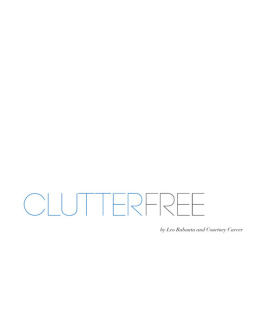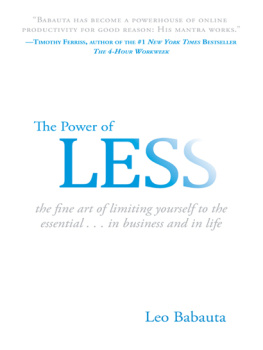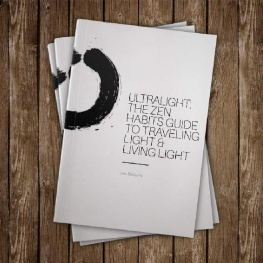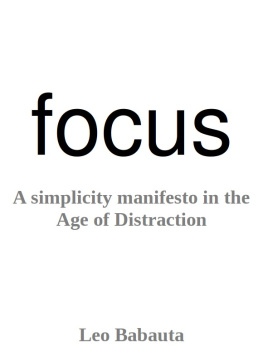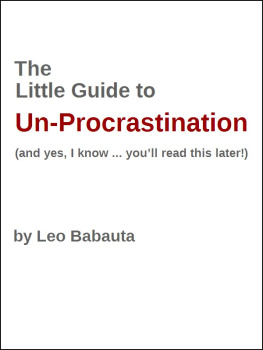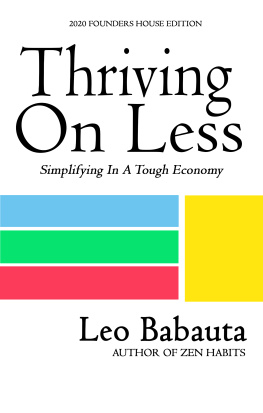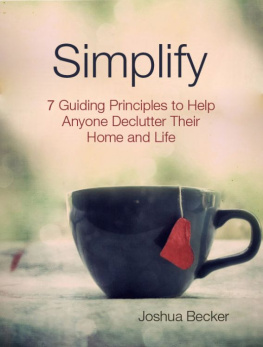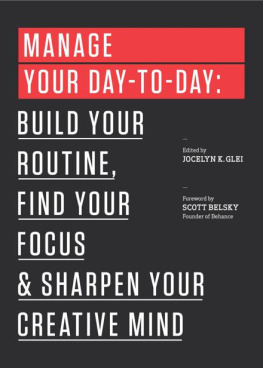Leo Babauta - ClutterFreebook
Here you can read online Leo Babauta - ClutterFreebook full text of the book (entire story) in english for free. Download pdf and epub, get meaning, cover and reviews about this ebook. year: 0, genre: Home and family. Description of the work, (preface) as well as reviews are available. Best literature library LitArk.com created for fans of good reading and offers a wide selection of genres:
Romance novel
Science fiction
Adventure
Detective
Science
History
Home and family
Prose
Art
Politics
Computer
Non-fiction
Religion
Business
Children
Humor
Choose a favorite category and find really read worthwhile books. Enjoy immersion in the world of imagination, feel the emotions of the characters or learn something new for yourself, make an fascinating discovery.
- Book:ClutterFreebook
- Author:
- Genre:
- Year:0
- Rating:4 / 5
- Favourites:Add to favourites
- Your mark:
- 80
- 1
- 2
- 3
- 4
- 5
ClutterFreebook: summary, description and annotation
We offer to read an annotation, description, summary or preface (depends on what the author of the book "ClutterFreebook" wrote himself). If you haven't found the necessary information about the book — write in the comments, we will try to find it.
ClutterFreebook — read online for free the complete book (whole text) full work
Below is the text of the book, divided by pages. System saving the place of the last page read, allows you to conveniently read the book "ClutterFreebook" online for free, without having to search again every time where you left off. Put a bookmark, and you can go to the page where you finished reading at any time.
Font size:
Interval:
Bookmark:
Contents
Section 1:
Section 3: Maint
Introduction
Clutter Free is designed to help you remove clutter from your home and your life.
Through 3 sections youll uncover the simplest ways to identify the essential and break your attachment to stuff.
Section 1 will help you understand why youve collected the clutter in the first place and why its so hard to get rid of for good.
Section 2 will show you step by step, and room by room how to get rid of the clutter.
Section 3 will give you ideas to live your new clutter free life with purpose and joy.
From your junk drawer to your closet, youll find actionable plans for each space in your home. In addition, youll learn how to set expectations for gift giving holidays, what clutter-free experiments might help jump start your journey, and how to maintain a new life with more time, space, money and energy.
This book is not about organizing your stuff every January, or the importance of spring cleaning. If you put these recommendations in place, this will be the last time you organize, declutter or have a yard sale.
Learn more about how to live a clutter-free life by joining simplicity authors Leo Babauta and Courtney Carver in a 4-week intensive course including self study PDFs, homework assignments, videos, live webinars and surprise guest speakers.
Visit clutterfreecourse.com for more information.
About the Authors
About Leo
Leo Babauta is a simplicity blogger & author. He created Zen Habits, considered one of the Top 25 blogs in 2009 by TIME magazine with over 230,000 subscrib-ers. He is also the creator of mnmlist.com and the best-selling books focus
and The Power of Less. Leo is considered a leading expert on habit creation, productivity and simplicity. Leo started Zen Habits to chronicle and share what he learned while changing a number of his own habits, which include:
Quitting smoking.
Becoming a runner.
Running several marathons and triathlons.
Waking early.
Becoming organized and productive.
Eating healthier.
Becoming a vegetarian.
Tripling his income.
Writing a novel and a non-fiction book.
Eliminating his debt.
Simplifying his life.
Losing weight (more than 60 pounds).
Writing several best-selling e-books.
Starting a successful Top 25 blog.
Starting a second blog for writers and bloggers.
Creating a leading blog on minimalism.
Living car-free.
About Courtney
Courtney Carver is the writer and founder of Be More With Less. She launched her blog in May 2010 to share a message of hope in simplicity. She left a 15 year career in sales and marketing in September 2011 to focus on writing, develop new ways to teach others to live more simply, and live a simpler life herself.
In addition to bemorewithless.com she created bemorewithless.com/busi
ness to encourage business owners and entrepreneurs to focus on the essential instead of getting lost in busy work.
Courtney was diagnosed with Multiple Sclerosis in 2006 and attributes her healthy lifestyle to simplifying every part of her life, from diet to debt. She moved from New England in 2004 to Salt Lake City where she lives with her husband, and 16 year old daughter.
Emotion
learn why and let go
The Psychology of Stuff
The simple action of getting rid of stuff will clear the clutter temporarily, but it might not contribute to a long lasting clutter-free lifestyle. When you lose weight, unless you understand why you were overweight in the first place, and why and how you ate the way you did, the weight will likely creep back on. Similarly, if you jettison your stuff without understanding why you bought it and hold on to it, stuff will creep back in.
Inanimate objects carry great responsibility to fix our lives. Without even knowing it, we depend on our stuff. Examples include:
the hope chest
a trust fund
worry dolls
a touch stone
While those are the obvious, take a brief of your inventory of your stuff and ask what you expected of each thing. Did you expect your bed to deliver a great night of sleep? Did you think your computer would make you money? Would your new wine glasses or ice cream maker make you popular?
Weve assigned so much power to stuff, that its become a challenge to let it go.
When you let go of stuff, it may feel like you are letting go of hopes and dreams when in reality, you are making room for them. While there are things that can help you accomplish something, you can not depend on stuff. You have to put your trust and faith in people, in yourself, and in God or the Universe or whatever you believe keeps the world spinning.
When you let go of the idea that the $250 backpack you bought will help you explore the world, you can sell the backpack and start to pay off the debt that is holding you back from traveling.
When you let go of the idea that the box of exercise equipment sitting in your living room will make you fit, you can dump the guilt and go take a walk, or hike, or do whatever activity you truly enjoy and shift towards a healthier lifestyle.
When you box up all the clothes that you thought made you look like a professional or any other way that you wanted to be perceived, you can start being who you are, instead of dressing the way you think you are supposed to.
Stuff is just stuff. Its plastic or metal, glass or paper. Each piece of stuff is shaped a little differently, but in the end, it will be in the same donation bin or landfill, likely never having met your expectations.
If you need to place trust in stuff, turn towards the good stuff like gratitude, compassion and happiness. Lean into love and laughter and away from another trip to the mall searching for stuff to change your life.
The Just in Case Syndrome
Pay attention to how many times you say just in case in one day. Youll be surprised at how often this excuse or reasoning pops up when you are making decisions. From deciding where to live, what to pack on a trip to what to make for dinner, just in case is always lurking.
You already know what the just in case syndrome is without a lengthy descrip-tion. You keep things (in your bag, or in your home or office) not because you actually need them, but just in case.
When we look at this with actual evidence, we see that just in case means we keep a lot of stuff we dont actually use. Try an experiment: monitor the just in case stuff you pack on a trip, or keep in your home. Make a list of the stuff you keep for just in case stuff you havent used in the last few months but are worried you might need. Then see how many times in the next 6-9 months you actually use that stuff.
Just in case is the reason we hold onto a lot of things. The vast majority of the time, we dont need them. But were afraid we might, so we hoard. It wards off insecurities about the future. Challenge that theory, let go and see what happens. Experience trumps fear.
Holding on to too much just in case is comfortable, but dangerous. Weve lived in excess for so long that it becomes hard to recognize what enough really is. The only way to see it is to start letting go. With each layer that you discard, youll reveal a little bit more about how living with less really does give you more.
Just in case has become a popular answer to why do you need that?. When you take time to finish the just in case sentence, you might find that its not a very good excuse.
Do you really need
8 coffee cups just in case 8 people are all drinking coffee at the same time?
3 purses just in case the bottom falls out of the 1 you use now.
the gold you were going to sell just in case the price of gold goes up.
Next pageFont size:
Interval:
Bookmark:
Similar books «ClutterFreebook»
Look at similar books to ClutterFreebook. We have selected literature similar in name and meaning in the hope of providing readers with more options to find new, interesting, not yet read works.
Discussion, reviews of the book ClutterFreebook and just readers' own opinions. Leave your comments, write what you think about the work, its meaning or the main characters. Specify what exactly you liked and what you didn't like, and why you think so.

